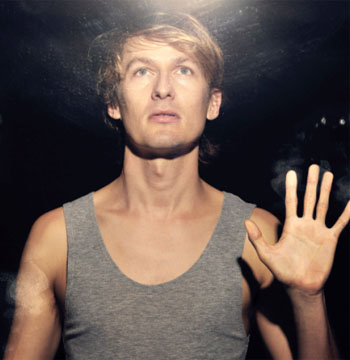The Duel |Thin Ice and STC
- June 9th, 2009
- Posted in Reviews & Responses
- Write comment

I have found this rather a difficult production to review as I must declare: this really isn’t my thing. I recently had the epic wonder of experiencing Elevator Repair Service’s The Gatz at The Sydney Opera House: an 8 hour theatre experience of The Great Gatsby which was nothing but a sublime once in a lifetime theatrical experience (which I will write up soon). This however, was not quite a reading, not quite a staging, not quite theatrical: though surrounded in theatrical devices and conceits. So here is my review… in which I question the effectiveness of this chapter of Dostoevsky adapted for stage. This is where I am the conservative reviewer: if it aint broke why fix it?
Next Stage is the development arm of the Sydney Theatre Company designed to assist artists in the development of new work. Since the start of the year, this has included Bell Shakespeare’s “Mind’s Eye” project Venus and Adonis directed by Marion Potts and Griffin Theatre’s production of Ross Mueller’s Concussion directed by Brett Adam. The Duel is the third production nurtured by Perth based company Thin Ice, headed by Matthew Lutton. This is a truly maginificent opportunity for artists to explore ideas, and create work in an alternative venue with a high level of production support for which the Sydney Theatre Company should be applauded.
Taken from a chapter of Dostoevsky’s The Brothers Karamazov, Tom Wright’s adaptation, directed by Matthew Lutton is an experimentation of form and genre, exploring the question which faces text-based storytellers: at what point does literature become a performance? Where as many theatrical pieces aim to show a “slice of life”, The Duel shows a slice of literature. Literature as accessible in trackpants, dunlop volleys and hooded sweatshirts: literature for the here and now. Dostoevsky’s story is not shown, but told through monologue, an occasional demonstration of events and an erratic sound track. This performance is the telling, not a showing of transformative choices within every person and dares the audience to engage with a conversation about guilt and freedom, responsibility, punishment and forgiveness.
A small ensemble of performers Luke Mullins, Brian Lipson, David Lee Smith and Renee McIntosh play multiple roles and ambiguously float between character, performer and audience to the story. With a simple claustrophobic set design and contemporary costume design by Claude Marcos, beautiful and transformative lighting design by Damien Cooper and creative sound design by Kingsley Reeve- the world of this story telling is at times beautiful, poetic and dull with domesticity: without an obvious meta-theatrical framing. This is a presentation of literature with theatrical design elements. The effect is academic: we can see what is happening, we are asked questions directly by the characters, we are told of the effects of a confession and its effects. We are asked to imagine these characters enacted by the actors which could be understood as an exploration of Brecht’s verfremdungseffekt. In The Duel, we see the exploration of movement, of the non-verbal, of gestural, a collision of the contemporary stage craft and an antique Russian rumination.
According to the program notes, Lutton had “no desire to substantially dramatise the events of the chapter”, and moments are indeed enacted: but with the character of Zosima narrating the event complete with his internal reasoning. We follow Zosima’s transformation from sibling, to soldier, to monk: assisted by personal illuminations, he explores the moment of change: significant personal change when a decision is made to put down a gun and fight, when a decision is made that the time to confess has come, when the decision to leave is the only decision left. Challenging questions collide with beautiful ideas of love, passion, rational thinking, connectedness and individualism and the duel is really a battle between grey moral principles.
Though a thoroughly engaging story, I am left asking questions of my own. Would I have understood, engaged with or been transformed by this story as much if I were to have read this story? Book in my lap, tea in hand? What is the value of a reading? Would I have understood this story as much if this was a radio play? After all it was the reading of this story (chapter) by Lutton which inspired him: if he had seen a production would it have had such a resonating effect?